Today we are going to decide between Crab grass vs Bermuda grass. Crab grass with a faster growth rate might be more suitable for some people. But some might prefer the lower maintenance needs of Bermuda. Keep in mind that these are warm-season grasses and are not suitable for cold areas. Bermuda grass also looks more lovely but also comes at a higher price tag than Crabgrass.
Crabgrass is essentially a weed while Bermuda is a turf grass and one of the best ones at that. Both being warm season grasses don’t go well against low temperatures. You need full sunlight for optimal growth. Crabgrass doesn’t grow in shady areas. Both Bermuda and crabgrass have high traffic tolerance as well.
So, we are going to take a deep dive and take a look at appearance, durability, shade and temperature tolerance, best uses to determine which is the better one for you.
Contents
Comparison of Crab Grass and Bermuda
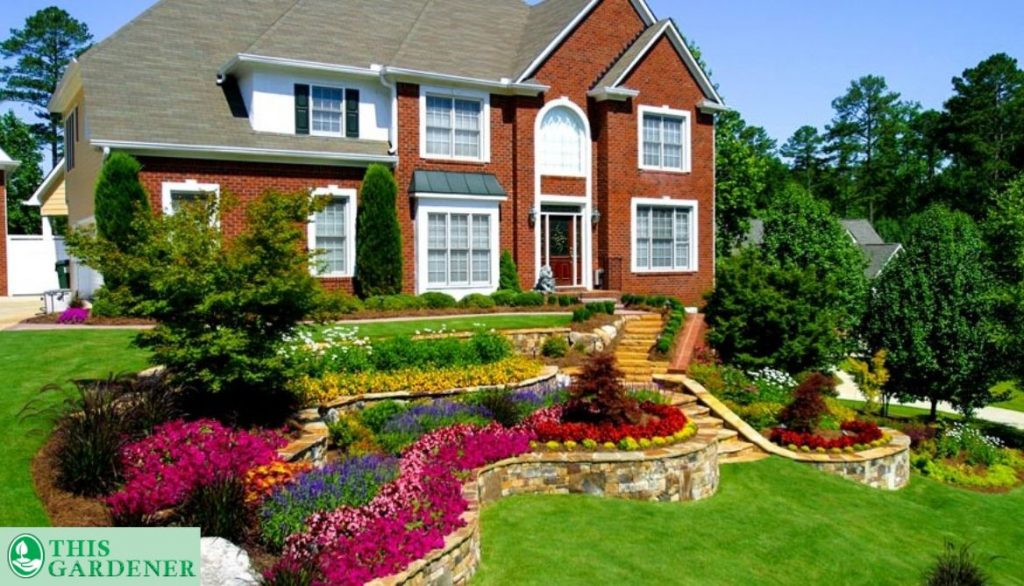
In the stand-off between crab grass and bermuda, we came up with the following:
- Crab grass is a weed that you should never use as lawn grass while Bermuda is a great choice as a turf grass
- Bermuda grass needs little maintenance whereas you need to care a lot for crab grass
- Both grass species are dormant and can take over the lawn if not cared for
- These grasses have a fast growth rate
Differences Between Crab Grass vs Bermuda
The following differences set them apart:
Parameters | Crab Grass | Bermuda Grass |
Color | Light Green | Blue-Green |
Leaf Type | Flat | Short & Flat |
Sunlight | Full Sun | Full Sun |
Soil | Well-drained | Sandy Soil |
Shade | Intolerant | Intolerant |
What is Crab Grass?
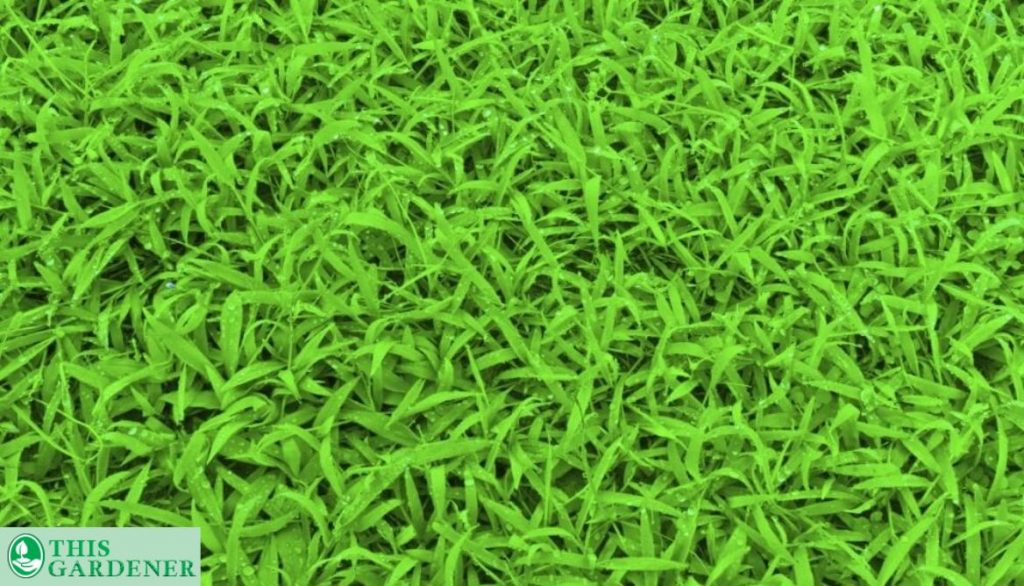
It is a type of grass weed that starts growing in the spring season. You don’t need to confuse it with turf grass as this is a weed that invades your lawn. You have two types of crab grass: hairy and smooth crab grass. It is great for areas with heavy foot traffic due to its rough nature.
Identifying features
- Wide & Flat grass blades
- Grows in clusters
- Purple-Green Stems
- Leaves are narrow and pointy
What is Bermuda grass?
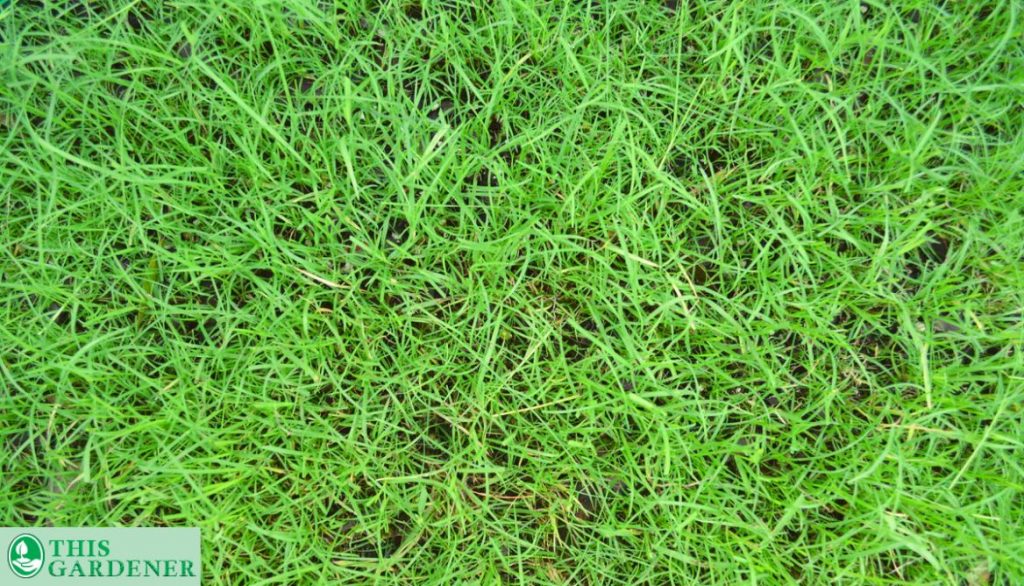
Bermuda grass, also known as Couch grass in some areas is highly desirable lawn grass. It has a fine leaf texture and with green color, looks stunning on a lawn. It is great in hot temperatures. It has a high drought tolerance than most grasses.
Identifying Bermuda grass
- Blue-Green Leaf
- Grows in big patches
- Visible stolons
- Flat leaves
Pros
Comparing Crab Grass vs Bermuda
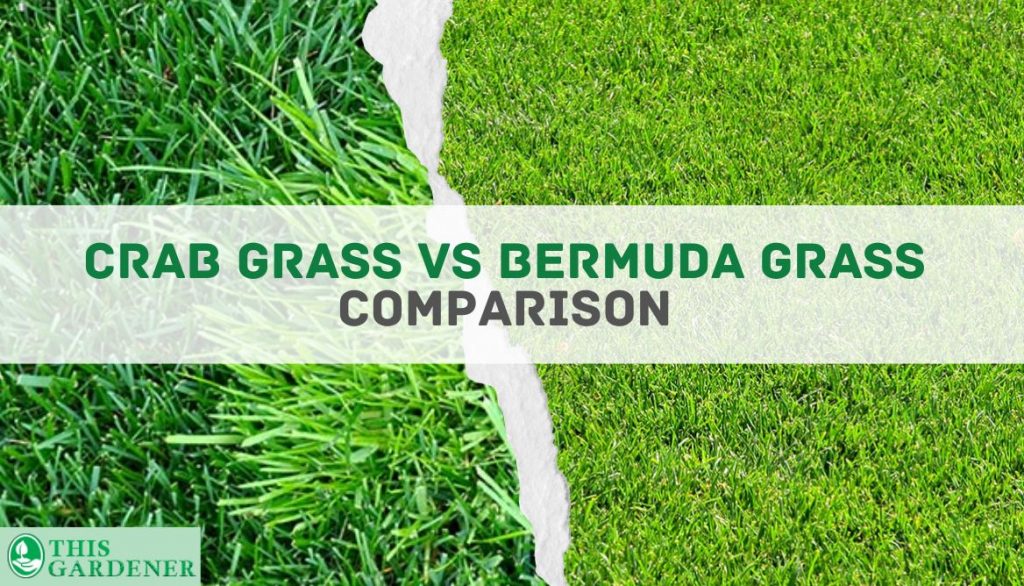
By now, it is clear that these are two very different grass types that are suited to entirely different purposes. We have compared the two in different categories so that you can get a better understanding of them.
Appearance (Smooth Crab grass vs Bermuda grass)
Appearance-wise, crab grass has very deep roots. With its big stem, it is not able to tolerate shade. The leaves are flat with pointy ends.
In contrast to the crab grass, Bermuda is totally different. It also comes with flat blades but with hairs on them. It forms a comfortable carpet on the ground.
Weeds, growth, and sod formation
Both of these grasses are very invasive and don’t any other plants to grow. So, weeds aren’t a problem for them. Both grow extremely fast which makes maintenance a hassle.
Crab grass grows in the form of clusters while Bermuda grass spreads through the stolons and rhizomes. Both of them have strong roots to withstand high traffic. You can get rid of the weeds using a pre emergent herbicide.
Best Uses
Bermuda grass with its complex roots and strong durability is great for busy areas. Also has a high tolerance to drought. Using Bermuda grass provides the feeling of flower beds.
Crab grass is a weed that does marvelously in high-traffic areas. While not having the flower beds feel but still is quite relevant in areas where there is a lot of heat and traffic. However, it is not suitable as lawn grass and thus is a highly undesirable weed.
Soil Types and pH Needs
Crab grass can be adapted to a lot of different soils but it generally prefers soil that is well-drained. It is very pH tolerant and can easily grow in varying pH levels from 5.5-7.5
Bermuda also requires well-drained fertile soils for the best growth. If you want Bermuda to grow faster then a pH between 6-7 is ideal. Sandy soil is great for the fast growth of Bermuda.
Water Needs
If you want to quickly sprout crabgrass seeds then you have to water them daily. However, as this is an invasive weed, you shouldn’t overwater it. Watering it two times per week is optimal.
Common Bermuda grass is also very invasive. When it comes to watering it, you only need about 1.5″/week. This is the ideal amount of watering required to maintain a pleasant-looking green lawn.
Fertilizer requirements
You need about 1 to 2 pounds of nitrogen in order to ensure optimal growth of crab grass seed heads.
When choosing the best fertilizer for Bermuda seed heads, make sure to choose one with no phosphorus, a high amount of nitrogen, and some potassium.
Sun, Shade, and Temperature Requirements (Warm Season Grass)
These grasses are pretty similar in one aspect. These are warm-season grasses. Crab grass likes direct sunlight and will not grow well in a cold area.
Bermuda grass tolerates high heat easily and prefers direct sunlight. It doesn’t tolerate shade and gets easily damaged if not enough sunlight is present. Due to the lack of sunlight, brown spots will start to appear in bermuda grass and it will get thinner over time.
Durability
These lawn grasses are highly durable. Crab grass with its rough texture and deep roots is pretty durable. It does remarkably well in high-traffic areas.
Common Bermuda grass due to its enhanced durability is used in a lot of traffic-intensive areas. It is a highly desirable lawn grass and Bermuda grass tolerates traffic like a champ.
Common Pests and Diseases
It is clear by now that Bermuda grass is a home lawn grass while crabgrass is a weed. Being a weed itself, crab grass itself is a problem to other lawn grasses due to its invasive nature.
Insects pose a threat to Bermuda grass but not as big as digging animals. This is due to the slower recovery time of this turf grass.
Mowing Needs
In order to control the crab grass, you need to mow it. The best height to mow crab grass is about 3 1/2″. Crabgrass thrives in this way without overwhelming other plants.
You need to mow bermuda about 2″. Its aggressive growth habits in the summer make it necessary to do a lot of mowing.
Cost of Maintenance
The cost of maintenance is pretty different for both types of grasses. On one hand crab grass requires a lot more resources to grow but Bermuda grass maintenance is also tough. This is due to its frequent mowing requirement. If you are regularly taking care and maintaining then the cost wouldn’t reach high.
Crab Grass vs Bermuda: Which Option is Right for You?
It entirely depends upon your use case. People use grasses in their homes, fields, etc. So, in order to make it easier for you, we have made different sections and will provide you with a straight and simple answer.
Choosing the Best Option for Climate
As both crab grass and Bermuda are warm seasoned, they prefer areas with high temperatures. So, it’s safe to say that they are warm season grass & prefer the hot summer months. They are also highly drought tolerant and don’t prefer shade.
Growing zones
Crab grass essentially spreads rapidly, grows everywhere and more so in home lawns. Bermuda grows best in the USDA zones of 7 to 10.
Summary: Both are more or less the same. But as Bermuda can be used a lawn grass, it comes out on top.
Choosing the Best Option Based on Maintenance
The maintenance needs for both types of grass are very similar. Crab grass is a high resource-demanding weed whereas you have to frequently mow Bermuda. Bermuda is also more expensive.
Summary: We think that crabgrass is better as it grows everywhere and requires less mowing
Choosing the Best Option Based on Susceptibility to Pests and Disease
In terms of pests and disease, both types of grass are quite similar. But the nail in the coffin for Bermuda is its slow recovery time
Summary: Due to its higher durability, Crab grass is the better choice.
Similarities between St Kentucky bluegrass vs Bermuda
Rapid Growing
The biggest similarity between the two types of grass is that both of them have a really quick growth rate.
Garden Bullies
Crab grass and Bermuda are like garden bullies as they don’t allow any other vegetation to grow.
Invasive Nature
The biggest problem with these grasses is their invasive nature. If you don’t care for them, these grasses will ruin your lawn.
FAQ
How can you tell crabgrass from Bermuda grass?
The dark green leaves of the Bermuda grass make a visual difference. Moreover, Crab grass is a weed and can be easily spotted.
Can Bermuda grass take over crabgrass?
Even though Bermuda grass is weed-invading but still crab grass is more likely to choke it out.
How can you tell the difference between grass and crabgrass?
Crab grass is a weed that grows in the form of clusters and is easily distinguishable from normal grass. It targets lawns and can easily take them over if not taken care of.
Why do people not like crab grass?
Crabgrass doesn’t make for a pleasing lawn and it overtakes everything. It has a dark green color and ruins everything.
Will Bermuda grass choke out crabgrass?
No, it is not likely for Bermuda to choke out a weed like crab grass.
What grass is better than Bermuda?
In our opinion, Tall Fescue is a better grass than Bermuda grass. It has tall blades, and establishes deep roots that provide high durability.
How do I know if I have Bermuda grass?
You can easily identify Bermuda through its blue-green leaf and stolons. Some variants of Bermuda also have fine hairs on the blades as well.
What kills crabgrass not Bermuda?
In order to get rid of crab grass, you need to use a crabgrass killer, something that contains Quinclorac. This will allow you to kill the weed without harming the grass.
Conclusion
Bringing this to an end, if you choose crabgrass, even though brings a lot of benefits like high heat tolerance, low mowing requirements, and less disease susceptibility, but still remains an intrusive weed. You can’t use crab grass in the lawn as it will take over it and eventually ruin it.
Bermuda grass is a better choice of the two as it will provide you with all of the benefits of crab grass and also with a lawn that is pleasant looking. So, which one is going to be your choice between these two? Let us know in the comments and share your feedback.
References
- What Is Crabgrass and What Does It Look Like? – Organic Lawns
- What Is Bermuda Grass? | myhomeTURF
- How to Get Rid of Crabgrass in Lawn & Kill it Naturally or Using Herbicides (crabgrasslawn.com)
- Common Bermudagrass | Purdue University Turfgrass Science at Purdue University
- Bermudagrass Area of Adaptation (pennington.com)
- How to Get Potatoes to Sprout Eyes: Detailed Growing Guide with 3 Options - July 31, 2023
- Weight of a Medium Potato: Revealed in Detailed Guide - July 29, 2023
- Maris Piper Potatoes: 9 Substitutes You Should Know About - July 27, 2023
Hello! I’m Jessica Zander, a garden coach and consultant based in the Boston area (zone 6b), offering virtual consultations across the country and Canada.
I’ve been passionate about gardening since the early 1990s, and in 2022, I launched You Can Do It Gardening to empower individuals to feel more confident in their gardening endeavors.
Following a 30-year career in nonprofit finance and operations, I transitioned out of that field in mid-June of 2023 due to the growing demand for coaching services. Interestingly, my years of presenting financial statements to boards and finance committees proved to be valuable experience for teaching people about gardening! I enjoy sharing skills, providing guidance and suggestions, and collaborating efficiently with clients to make significant improvements to their outdoor spaces, both small and large. I also regularly teach at the Arlington Continuing Education and Cambridge Adult Education.
My approach is direct and practical, akin to Mary Poppins, but tailored to your garden. Clients find satisfaction in saving money and taking pride in their own gardening achievements.

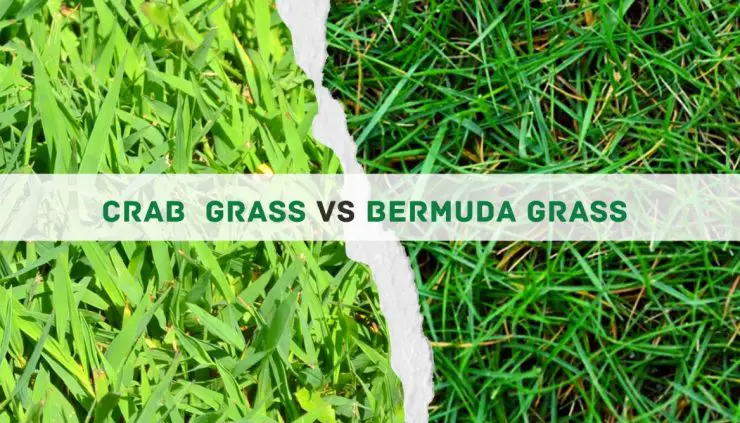

Add comment